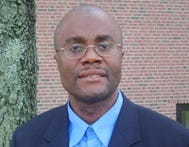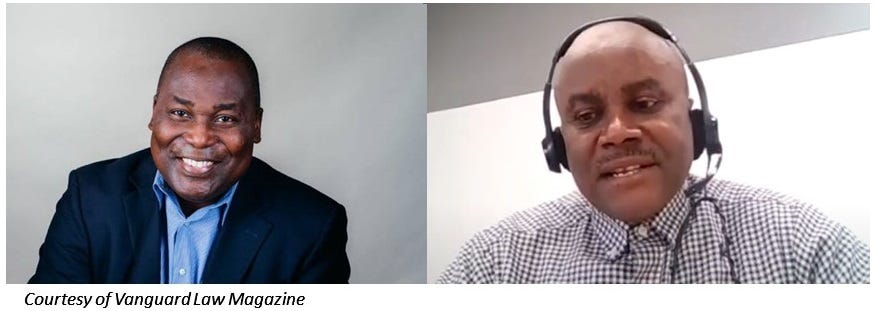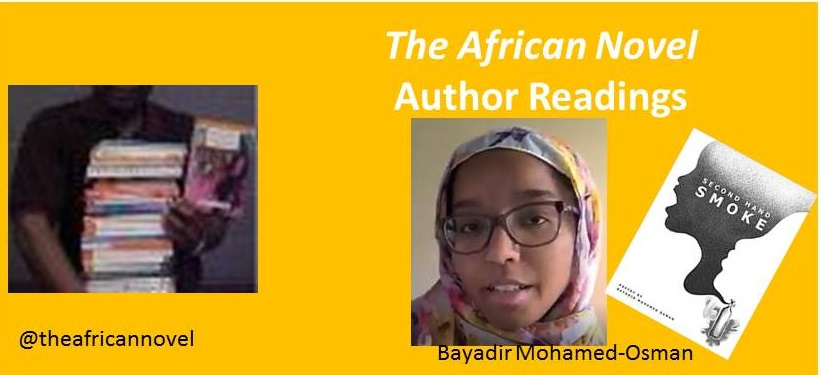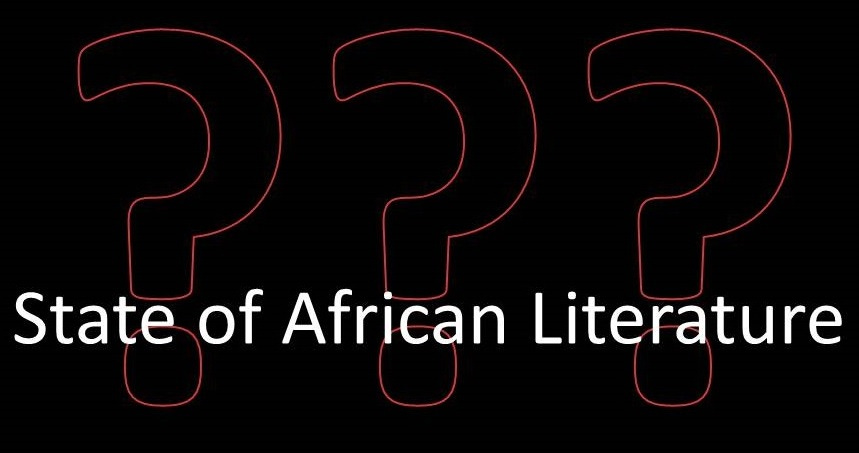Welcome to the latest issue of The African Novel digital newsletter. You have joined an exciting global community of publishers, authors, readers, writers, poets, and performers, as well as academics, missionaries, and even current and former Peace Corps volunteers. We are all connected in our passion for appreciating, celebrating, and sharing African literature and performance in its many forms.
To savor this e-newsletter, we’d highly recommend you patiently read from top to bottom!
Thanks for reading The African Novel! Subscribe for free to receive new posts and support my work.
Subscribed
Thanks for reading The African Novel! Subscribe for free to receive new posts.
IN THIS ISSUE
Editor-in-Chief's Message
Book Review: Everything Good Will Come
The African Novel Podcast: Novelist Benjamin Kwakye (Part II)
Author Readings: Bayadir Mohamed-Osman
State of African Literature
Bookshelf
Book Events & More
Our Radio Archives
African Proverb: Congolese
Editor-in-Chief’s Message
Rest in Peace, my Beloved Uncle!
Dear Reader,
We missed publishing an issue of this digital newsletter in April as a result of my recent personal loss and unplanned travel to Nigeria. Hope you do forgive us as a team.
My beloved priest uncle returned to Nigeria in 1977 after stints in Ireland and the United States in pursuit of higher education. As a university student in Dublin, Ireland, he was away as the 13-month tragic Nigerian civil war of 1969 to 1970 raged on that reportedly claimed 1 million Biafrans of southeastern Nigeria.
After my uncle came back home, he apparently saw in me a curious, budding scholar in his late teens. Without thinking twice, he would engage me in swapping folk and other stories with him under the moonlit sky outside the rectory of his first Catholic parish in Imo State, Nigeria.
He introduced me to the 17th/18th century English poet and satirist Alexander Pope. He quoted freely from the Augustan-period author of The Rape of the Lock and An Essay on Man. The only Pope I knew at the time was Pope Paul VI. Through our after-dinner conversations, my uncle gave more life to my love of literature. Three years after he returned to Nigeria, he paved the way for me to emigrate to the U.S. for a university education. I will forever be grateful to him for everything.
As one of countless first- and second-generation nephews and nieces of the Ibe lineage, we are mourning the loss of this genuinely loving uncle. I will never forget how he pushed aside his breakfast tray one morning in the village in January 2022 to experience an important interaction. My four teenage children went to bid him farewell as we were about to head back to Lagos to return to the U.S. at the end of a family vacation. He looked them warmly in the eye — one by one — to exchange parting words with my children: stay in school and achieve high goals; be prayerful throughout life; and do not forget to lean on the love of family.
My beloved uncle, Very Reverend Monsignor Marcellinus U. Ibe, died in Nigeria on March 29. He was 98 years old. Ordained priest on April 5, 1964, he labored in God’s vineyard – as a parish priest, principal of several high schools, and even as a farmer – for nearly 60 years.
I often aver that I was lucky to be born to be propped up by a tripod of strong males in my life, with my mother as the middle, fourth leg. My paternal grandfather, my father, and my priest uncle were my male tripods. My uncle was the last one alive of the men on whose shoulders I stood.
He-is-gone now!
His death caused me to travel to Nigeria to pay my last respects to a life well-lived for the love of family, love of humanity, and service of God through the Catholic church.
What do I do now? Nothing but to go on living. My uncle will continue to live in every move I make for the rest of my life that reflects any of the many virtues he instilled in us – prayerfulness, hard work, ambition, determination, and courage, among others.
Rest in peace, my beloved priest uncle!
Enjoy!
Cyril Ibe, Ph.D.
P.S. Perhaps a friend forwarded this email to you. Sign up now to receive The African Novel directly in your inbox.
Please share the enjoyment of reading The African Novel digital newsletter with a friend, family member, or colleague.
Title: Everything Good Will Come
Author: Sefi Atta
Publisher: Interlink Books (2007)
Reviewer: Dike Okoro
A coming-of-age story of a Yoruba woman in post-Biafra-war Nigeria, Everything Good Will Come leaves readers enchanted with myriad conflicts and struggles pitting friends and families amid divided loyalties.
Sefi Atta’s works have always returned home to carve open vestiges of home-grown life lessons. This novel does not disappoint as it explores the tension hovering over eleven-year-old Enitan. For example, will her mother, who has embraced the religious life following the death of her brother, approve of her friendship with Sheri Bakare, a neighbor next door?
Atta’s story centers on the friendship of Enitan and Sheri, two girls whose worldviews seem absorbed by the local myths that must be broken for them to enjoy the freedom that comes with growing up in a war-free Nigeria. As Atta proves through her character development, Enitan is no weakling in a patriarchal African society.
She is portrayed as a courageous and confident girl who grows up knowing all the makings of her society: military dictatorship, politics, and poverty. Included in this self-awareness is a disarming spirit of rebellion. She eventually gets married but would not be coerced into traditional feminine submission. Hence, following the pressures of political and familial terrains mounted on her family, she makes the ultimate sacrifice of venturing into activism.
Atta’s novel also explores familial relationships. Enitan learns from her mother how feminity is a powerful tool for self-discovery. When her father is imprisoned, she turns to her mother for comfort and life lessons. When she meets Mike, an artist whose interest is chiefly vested in the representation of traditional gods from Yoruba and Igbo backgrounds, they form a relationship that extends beyond the boundaries of culture.
In the end, Enitan’s quest for freedom outlives any fears she harbors. Her father’s imprisonment and her mother’s death teach her hard lessons about life. The tragedy of Sheri’s rape teaches Enitan that navigating life as a young woman requires a form of vigilance, including interactions with male friends, that can be heart-wrenching but important.
Sefi Atta is the winner of the 2006 Wole Soyinka Prize for Literature in Africa and the 2009 Noma Award for Publishing in Africa.
Editor’s Note: Reviewer Dike Okoro is Senior Research Fellow at the Ken Saro-Wiwa Foundation.
Episode #12: Repeat Part 2
Ghanaian-born novelist and poet Benjamin Kwakye talks with Cyril Ibe about his works and the moniker “resident novelist,” for which he has been known since his first novel, The Clothes of Nakedness, was published in 1998.
Past Podcast Episodes:
Ghanaian novelist and poet Benjamin Kwakye Part 1, author of Songs of Benjamin and other titles
Gambian poet Tijan Sallah (Parts 1 & 2), author of I Come from a Country
Poet Obiwu Iwuanyanwu, author of Tigress at Full Moon
Harlem-based writer Obi Nwizu, author of Residue
Jeanne-Marie Jackson, author of The African Novel of Ideas
Patricia Jabbeh Wesley, author of Praise Song for My Children
Bayadir Mohamed-Osman, author of Second Hand Smoke
Vanessa Onwuemezi, author of Dark Neighbourhood
Cyprian Njoku Josson, author of The Immigrant Ladder
Kabuika Kamunga, author of Kabuika Wants to Make New Friends
Author Readings
Hear authors themselves reading from their works.
Sudanese poet Bayadir Mohamed-Osman reads from her new collection of poetry titled Second Hand Smoke.
Questions on the State of African Literature
Three questions are posed to writers every month. Listen here to their answers.
Responding to the questions below is Liberian-born Poet Patricia Jabbeh Wesley.
Are writers of African fiction “taking the literary world by storm?” these days?
Is the “tide turning” for African literature in America and the rest of the West?
Are we witnessing “a renaissance” of African literature today?
Bookshelf
What writers and readers of African titles are reading:
Young writer Adaobi Iwuanyanwu:
The Song of Achilles by Madeline Miller
I Fell in Love with Hope by Lancali
Night and Day by Virginia Woolf
The Great Gatsby by F. Scott Fitzgerald
If We Were Villains by M.L. Rio
It Ends With Us by Colleen Hoover
Where the Crawdads Sing by Delia Owens
Poet Tijan Sallah from the Gambia: African Literature and the CIA: Networks of Authorship and Publishing by Caroline Davies; Ancient Ghana and Mali by Nehemiah Levtzion; Nonrequired Reading by Wislawa Szymborska; African Literature Comes of Age, African Literature Today 40, edited by Ernest Emenyonu.
Comparative literature professor Jeanne-Marie Jackson (Baltimore, Maryland): Brotherhood by Mohamed Mbougar Sarr (in English translation; French original); The Wolf at Number 4 by Ayo Tamakloe-Garr; The Madhouse by T.J. Benson; and An Unusual Grief by Yewande Omotoso (just started reading).
Poet Obiwu (Ohio, USA): The Girl with the Louding Voice by Abi Dare; Ijele by Uche Nduka; Samarkand by Wole Soyinka; Ingrid Joker: Poet Under Apartheid by Louise Viljoen.
Writer Arinze Ifeakandu: Hue and Cry by James Alan McPherson, and The Great Mistake by Jonathan Lee.
Writer Obi Nwizu (New York): Another Country by James Baldwin and The Girl With the Louding Voice by Abi Dare.
Poet Bayadir Mohamed-Osman (Maryland): Pathologies of Power: Health, Human Rights, and The New War on the Poor by Dr. Paul Farmer; Secrets of Divine Love by A. Helwa.
Writer/Poet Vanessa Onwuemezi (London): The Palmwine Drinkard by Amos Tutola; Lote by Shola Von Reinhold.
Novelist Cyprian Josson (Chartres, France): Ladies Trip by Fanny Enoh; Burning Grass by Cyprian Ekwensi.
Novelist Benjamin Kwakye (Michigan, USA): Chronicles from the Land of the Happiest People on Earth by Wole Soyinka; The Love Songs of W.E.B. Du Bois by Honoree Fanonne Jeffers.
Cyril Ibe (Ohio, USA): Things Fall Apart (in French)/Le Monde s’effondre by Chinua Achebe; Songs of Benjamin by Benjamin Kwakye.
(As a reader or subscriber of this newsletter, you can submit titles of African fiction and other books on your reading list. Tell us in what part of the world you reside).
Book Events & More…
What: All African Women Poetry Festival, featuring 10 poets from across Africa celebrating African literature, culture, and diversity.
It is organized by Tuniq Africa Ltd., and sponsored by the KGL Foundation and Outre.
When: May 25-May 28, 2023.
Where: Art Africa Gallery, the British Council as well as the Dikan Center in Accra, Ghana.
For more information: Visit here.
On Demand:
What: Library of Congress’ Interviews with African Writers, a three-part series titled “Conversations with African Poets and Writers Series.” Featured are Nigerian-born author Chimamanda Ngozi Adichie, South African novelist and playwright Damon Galgut, and Tanzanian-born novelist and Nobel Laureate Abdulrazak Gurnah.
When: Available since May 2022.
Where: Library of Congress
For more information: Visit here.
Our Radio Archives
Coming soon: Offerings of rare, exclusive interviews and audio documentaries for our paid subscribers.
A partial list of archived Premium offerings:
Interview: Chinua Achebe biographer Ezenwa-Ohaeto
Interview: Nobel Laureate Wole Soyinka on his legendary cousin, Fela
Interview: The Black press in America
Interview: South African novelist Mark Mathabani
Audio Documentary: Eighty Gifts for Poet Laureate Gwendolyn Brooks
An audio tour of the Mandela House Museum in Soweto, South Africa
Interview: Ethiopian-Jewish Filmmaker Orly Malessa
Interview: U.S. filmmaker Ileen LeBlanc on Take Us Home, a documentary pic on the exodus of Ethiopian Jews to Israel.
Interview: American historian Edward Haas on slavery, the civil war, and the uncelebrated heroism of Blacks in the Union Army.
Interview: Herbert Martin, professor emeritus of English literature and African-American studies at the University of Dayton and co-editor of The Collected Novels of Paul Laurence Dunbar (Ohio University Press).
Thanks for reading The African Novel! Subscribe for free to receive new posts and support our work.
Subscribed
African Proverb
“The friends of our friends are our friends.” — Congolese proverb
Our Team
Cyril Ibe, Ph.D., Editor-in-Chief (Ohio)
Resident Novelist/Reviewer Benjamin Kwakye (Michigan)
Nollywood Director/Filmmaker/Novelist Cyprian Josson (Chartres, France)
Contributor/Writer Kabuika Kamunga (Rochester, Minnesota)
Past Issues of The African Novel eNewsletter:
Issue #4
Thanks for reading The African Novel! Subscribe for free to receive new posts and support my work.











